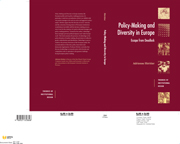Book contents
- Frontmatter
- Contents
- Acknowledgements
- 1 Escaping deadlock: policy-making in Europe
- 2 The context of subterfuge: diversity, fragmentation and the malleability of the European polity
- 3 The analytical approach and theoretical background
- 4 Market-making policy: transport and telecommunications
- 5 The provision of collective goods and the reduction of externalities: environmental policy
- 6 Market-correcting, redistributive policy: regional and social policy
- 7 Market-correcting, distributive policy: research and technology
- 8 Summary and conclusion: stalemate and subterfuge across policy areas
- References
- Index
8 - Summary and conclusion: stalemate and subterfuge across policy areas
Published online by Cambridge University Press: 22 September 2009
- Frontmatter
- Contents
- Acknowledgements
- 1 Escaping deadlock: policy-making in Europe
- 2 The context of subterfuge: diversity, fragmentation and the malleability of the European polity
- 3 The analytical approach and theoretical background
- 4 Market-making policy: transport and telecommunications
- 5 The provision of collective goods and the reduction of externalities: environmental policy
- 6 Market-correcting, redistributive policy: regional and social policy
- 7 Market-correcting, distributive policy: research and technology
- 8 Summary and conclusion: stalemate and subterfuge across policy areas
- References
- Index
Summary
Deadlock and subterfuge occur in various forms and modes, as shown by the exploration of specific policy areas. But how do the explanations of why deadlock occurs and how it is overcome compare across policy issues? It was claimed that decision-making in Europe has a distinct tendency to stall in all types of arenas because, in a system of multi-level governance involving very diverse actors and ruled by quasi-unanimity, policy-making is likely to reach stalemate if one of the actors presumes that the application of any given policy will cause them economic loss, impair their decision-making competences or impose additional costs of instrumental adjustment. Given that the great majority of decisions taken entail one or other type of costs for those concerned, there is a strong in-built tendency for the decision-making process to be brought to a halt in all policy areas under investigation.
In market-making policy, road haulage and telecommunications, the decisional process was blocked because sectoral actors (road haulage associations and the state-owned PTTs) anticipated economic losses. In the telecommunications sector this fear was reinforced – due to the public, monopolistic nature of the service deliverer – by the prospect of losing considerable institutional decision-making power. And in both areas there was a marked unwillingness to accept a new regulatory approach which would involve high costs of instrumental adjustment, if not the actual abolition of key actors traditionally dominant in the sector.
- Type
- Chapter
- Information
- Policy-Making and Diversity in EuropeEscape from Deadlock, pp. 87 - 98Publisher: Cambridge University PressPrint publication year: 1999



